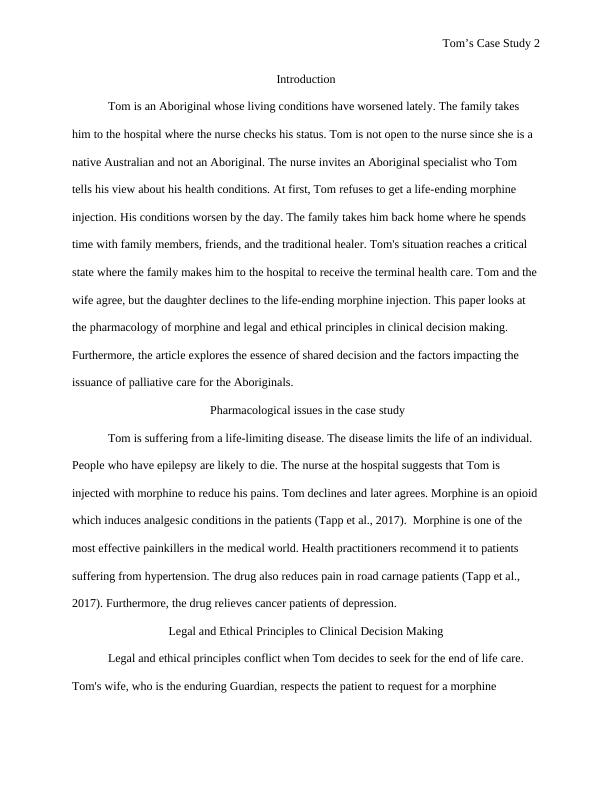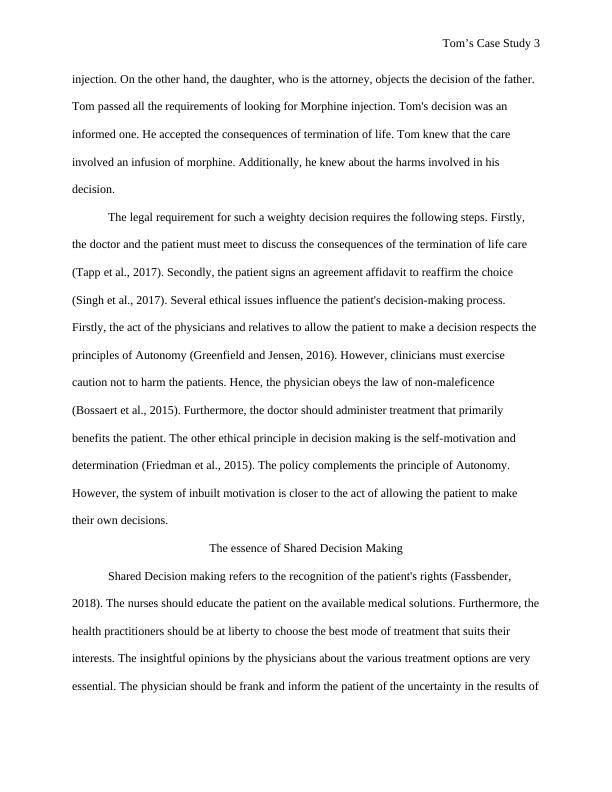Legal and Ethical Principles in Clinical Decision Making
Added on 2021-06-14
9 Pages2422 Words44 Views
Tom’s Case Study 1TOM’S CASE STUDYby Student’s NameCode + Course NameProfessor’s NameUniversity NameCity, StateDate

Tom’s Case Study 2IntroductionTom is an Aboriginal whose living conditions have worsened lately. The family takes him to the hospital where the nurse checks his status. Tom is not open to the nurse since she is a native Australian and not an Aboriginal. The nurse invites an Aboriginal specialist who Tom tells his view about his health conditions. At first, Tom refuses to get a life-ending morphine injection. His conditions worsen by the day. The family takes him back home where he spends time with family members, friends, and the traditional healer. Tom's situation reaches a critical state where the family makes him to the hospital to receive the terminal health care. Tom and thewife agree, but the daughter declines to the life-ending morphine injection. This paper looks at the pharmacology of morphine and legal and ethical principles in clinical decision making. Furthermore, the article explores the essence of shared decision and the factors impacting the issuance of palliative care for the Aboriginals. Pharmacological issues in the case studyTom is suffering from a life-limiting disease. The disease limits the life of an individual. People who have epilepsy are likely to die. The nurse at the hospital suggests that Tom is injected with morphine to reduce his pains. Tom declines and later agrees. Morphine is an opioidwhich induces analgesic conditions in the patients (Tapp et al., 2017). Morphine is one of the most effective painkillers in the medical world. Health practitioners recommend it to patients suffering from hypertension. The drug also reduces pain in road carnage patients (Tapp et al., 2017). Furthermore, the drug relieves cancer patients of depression.Legal and Ethical Principles to Clinical Decision MakingLegal and ethical principles conflict when Tom decides to seek for the end of life care. Tom's wife, who is the enduring Guardian, respects the patient to request for a morphine

Tom’s Case Study 3injection. On the other hand, the daughter, who is the attorney, objects the decision of the father. Tom passed all the requirements of looking for Morphine injection. Tom's decision was an informed one. He accepted the consequences of termination of life. Tom knew that the care involved an infusion of morphine. Additionally, he knew about the harms involved in his decision.The legal requirement for such a weighty decision requires the following steps. Firstly, the doctor and the patient must meet to discuss the consequences of the termination of life care (Tapp et al., 2017). Secondly, the patient signs an agreement affidavit to reaffirm the choice(Singh et al., 2017). Several ethical issues influence the patient's decision-making process. Firstly, the act of the physicians and relatives to allow the patient to make a decision respects the principles of Autonomy (Greenfield and Jensen, 2016). However, clinicians must exercise caution not to harm the patients. Hence, the physician obeys the law of non-maleficence(Bossaert et al., 2015). Furthermore, the doctor should administer treatment that primarily benefits the patient. The other ethical principle in decision making is the self-motivation and determination (Friedman et al., 2015). The policy complements the principle of Autonomy. However, the system of inbuilt motivation is closer to the act of allowing the patient to make their own decisions.The essence of Shared Decision MakingShared Decision making refers to the recognition of the patient's rights (Fassbender, 2018). The nurses should educate the patient on the available medical solutions. Furthermore, thehealth practitioners should be at liberty to choose the best mode of treatment that suits their interests. The insightful opinions by the physicians about the various treatment options are very essential. The physician should be frank and inform the patient of the uncertainty in the results of

End of preview
Want to access all the pages? Upload your documents or become a member.
Related Documents
(PDF) End-of-life issues for aboriginal patientslg...
|6
|1593
|232
End of Life Carelg...
|9
|2385
|302
Legal and Professional Issues in Nursing - Doclg...
|8
|2194
|62
(pdf) Nursing Assignment Samplelg...
|9
|2416
|21
Communication Issues in Palliative Care: A Case Studylg...
|8
|2110
|2
Palliative Care: Legal and Ethical Principles, Effective Communication, and Care Planlg...
|8
|2386
|343
